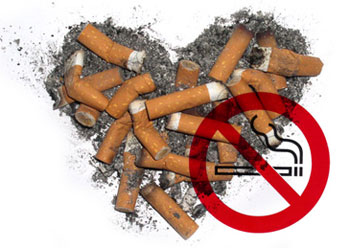Many scientific studies conducted in Israel and around the world have proven that cigarette smoking even causes heart disease, and about 75% of the heart attacks that occur among people up to the age of 45 are among people who smoke
Nava Inbar

Many of the smoking public in Israel are aware of the damage of smoking to their lungs and work because many different types of cancer are caused as a result. At the same time, many scientific studies conducted in Israel and around the world have proven that cigarette smoking even causes heart diseases and about 75% of the heart attacks that occur among people up to the age of 45 are among people who smoke. The risk level of people who smoke under the age of 40 to have a heart attack is 5 times greater compared to non-smokers and over 50% of myocardial infarction cases in women are caused by smoking.
Every year, about half a million hospitalization days are recorded in Israel as a result of smoking. Among those hospitalized in the various medical centers in Israel as a result of smoking, about 64% suffer from heart diseases. How, then, can the connection between smoking, blood circulation and the heart be explained?
The nicotine inhaled together with the tobacco smoke causes the blood capillaries to constrict. The narrowing of the blood capillaries causes a decrease in the amount of oxygen-enriched blood reaching the body and the result is damage to the organ that is fed by the constricted blood vessel. If the process continues for a long time, there may be a complete blockage of the blood vessels and, as a result, serious damage to the functioning of certain areas of the brain, which may even end in paralysis of limbs or death. Another possible result is myocardial infarction, a potentially fatal disease. Myocardial infarction is today the leading cause of death in developed countries. As mentioned, among middle-aged smokers, the size of the heart attack rate is twice and more than among non-smokers. Today, the number of people hospitalized with a myocardial infarction under the age of 50 is on a noticeable upward trend, and among these patients, the vast majority are smokers. Other severe malfunctions, which may be caused by the narrowing of the blood capillaries, are damage to the kidneys and the lower limbs, which are especially vulnerable to circulatory disorders. In severe cases, Birger's disease develops as a result, a disease in which the sufferer may end up having his leg amputated. To this should be added the other circulatory diseases, coronary blood vessel diseases, hypertension, coronary arteriosclerosis and more.
Among women the risk is even worse. It was found that the use of birth control pills may increase the risk of heart disease among women who smoke compared to non-smokers. The explicit recommendation of the doctors to smoking women taking pills is to stop smoking. As long as they have not done so, it is not recommended for them to use birth control pills.
In the last year, the State of Israel joined the enlightened countries that require the printing of 12 alternate warning forms prepared by a team of the Ministry of Health, the Cancer Society, the Israeli Forum to Fight Smoking and other health organizations, on the cigarette boxes. The warnings are all based on unequivocal medical studies, two of which even deal with the connection between smoking and heart diseases and are worded as follows: "Cigarettes cause strokes and heart diseases" and "Medical studies state that 75% of heart attacks up to the age of 45 are among smokers." It is assumed that these warnings will increase the awareness among the smoking public in Israel of the many dangers found in smoking apart from the link to cancer.
If any of the readers are looking for a reason to quit smoking, the good news is that one year after quitting smoking, the risk of getting heart disease drops by 50%. Within 15 years, a former smoker's relative risk of dying from heart disease approaches that of a person who has never smoked in their lifetime.
This article is based on the booklet "Questions and Answers about Smoking" published by the Cancer Society, which can be obtained free of charge, by contacting 'Talmide', the telephone information service of the Cancer Society that is manned 24 hours a day: 1-800-599-995.
The writer is the spokeswoman for the Cancer Society

4 תגובות
Stop smoking and start working out in the gym!!!! 🙂
Someone once told me that if you stop smoking for 4 years it is equivalent to forty years in terms of the body, something like that.
This is true?
My friend's mother smoked for 11 years and not a little at all. She stopped about two years ago and is now pregnant. Are there any consequences for the baby's health (really hope not).
I understood that there are additional risks in smoking and taking birth control pills, they are not pleasant at all.
I used to smoke a pack a day but I had to make concessions with how hard it was to stop I would in a second prefer to give up smoking again than to stop taking Paminate and continue to risk